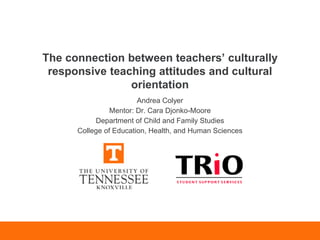
Connection between teachers' culturally responsive attitudes and cultural orientation
- 1. The connection between teachers’ culturally responsive teaching attitudes and cultural orientation Andrea Colyer Mentor: Dr. Cara Djonko-Moore Department of Child and Family Studies College of Education, Health, and Human Sciences
- 2. Culturally Responsive Practices • Including bilingual and multicultural children’s books • Playing various types of cultural music • Displaying images of all genders in non-stereotypical roles • Providing access to materials needed for children to accurately represent themselves • Differentiating instruction to reach children with differing learning styles
- 3. Culturally Responsive Teaching • Places value on children’s home culture • encourages and validates cultural identity • Fosters communication between children, parents/guardians, and teachers • Utilizes children’s experiences and perspectives to teach academic concepts (Gay, 2002, p.10) Photo: Chicago Public Schools
- 4. Cultural Orientation • How far an individual falls on an individualism/collectivism scale • Individualist Culture (Gorodnichenko & Roland, 2012) • Values freedom as it is needed for self-achievement • Relationships viewed as reciprocal exchanges • Does not consider others when making choices • Collectivist Culture (Gorodnichenko & Roland, 2012) • Strive for conformity • Obligations to fixed relational network • When making decisions, focuses on goals of the group
- 5. Purpose • What is the relationship between early childhood teachers cultural orientation and culturally responsive teaching attitudes? Research Question • Examine the relationship between early childhood teachers' cultural orientation, their attitudes toward culturally responsive teaching, and their culturally responsive teaching practices. • Attempt to understand different characteristics of teachers that may promote or hinder culturally responsive ideals.
- 6. Additional Questions • Will Culturally Responsive Attitudes increase as collectivism increases? or vice versa? • What do teachers identify with? • Does being in a helping profession equate to higher levels of collectivistic ideals? • Camaraderie among teachers anecdote
- 7. Methods Population A) Teaching Staff at the Early Learning Center • 2 Male; 14 Female • All of Caucasian/White decent • Possess or working toward master degree B) Early Childhood Educators (Birth to Eight) • Public and private settings in the United States Measures Online survey consisting of: • Two validated scales utilizing Likert-type questions • One teacher survey focusing on classroom practices • One demographic questionnaire
- 8. Methods Procedures for Sample A • Administered through Qualtrics • An email with details about the survey will be sent to the work email accounts of each teaching staff member • Each individual will receive a unique identifying code to ensure confidentiality • The link will be live for 4 weeks • There is no incentive for completing the survey
- 9. Methods Procedures for Sample B • Administered through Qualtrics • Anonymous • Direct link posted on Facebook, Twitter, and Instagram • Using the hashtags #teacherlife #teachersofinstagram #earlychildhood #earlychildhoodeducation on Instagram and #teachers #teach #education #ECE on Twitter • within teacher social groups on Facebook such as “Simply Kinder” and “The PreK Spot” • The link will be live for 4 weeks • There is no incentive for completing the survey
- 10. Limitations Sample A • Highly Trained Staff • Master Degrees or working towards them • Atypical philosophy • Not representative of typical day care or public PreK experience • Cannot generalize Sample B • Convenience Sample • Response Bias • Cannot generalize findings based on the data collected
- 11. Analysis • Currently awaiting IRB approval • Data will be quantitatively analyzed using Pearson’s Correlations and Linear Regressions in SpSS • Sample A and Sample B will be analyzed separately
- 12. Acknowledgements • Dr. Cara Djonko-Moore, Assistant Professor in the Department of Child and Family Studies • The Educational Advancement Program at the University of Tennessee, Knoxville • The Summer Research Institute 2016 Cohort
- 13. References Gay, G. (2002). Preparing for culturally responsive teaching. 2001 AACTE Outstanding Writing Award, 53(2), 106-116. doi:10.1177/0022487102053002003 Gorodnichenko, Y., & Roland, G. (2012). Understanding the Individualism-Collectivism Cleavage and its Effects: Lessons from Cultural Psychology. Institutions and Comparative Economic Development, 150, 213-225.
- 14. Questions?
